The "GR-PEACH_Audio_Playback_Sample" is a sample code that can provides high-resolution audio playback of FLAC format files. It also allows the user to audio-playback control functions such as play, pause, and stop by manipulating key switches.
Dependencies: R_BSP TLV320_RBSP USBHost_custom
Note
For a sample program of with LCD Board,
please refer to GR-PEACH_Audio_Playback_7InchLCD_Sample.
Introduction
The "GR-PEACH_Audio_Playback_Sample" is a sample code that can provides high-resolution audio playback of FLAC format files. It also allows the user to audio-playback control functions such as play, pause, and stop by manipulating key switches.
1. Overview of the Sample Code
1.1 Software Block Diagram
Figure 1.1 shows the software block diagram.
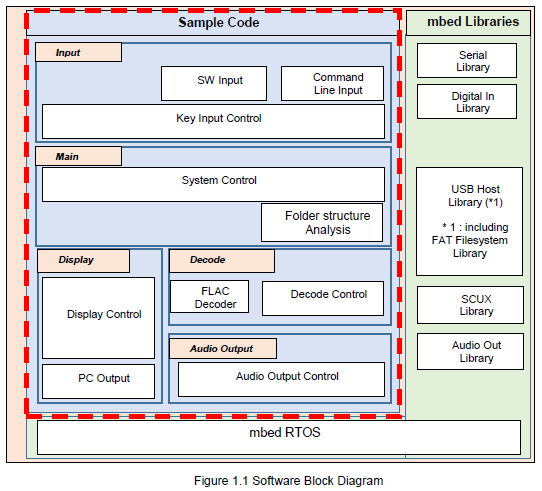
1.2 Pin Definitions
Table 1.1 shows the pins that this sample code are to use.
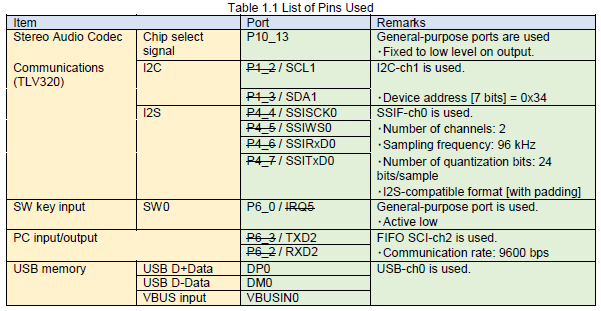
2. Sample Code Operating Environment
This sample code runs in GR-PEACH + the Audio/Camera shield for the GR-PEACH environment. This section explains the functions of the ports that are used by this sample code.
2.1 Operating Environment
Figure 2.1 shows the configuration of the operating environment for running this sample code.
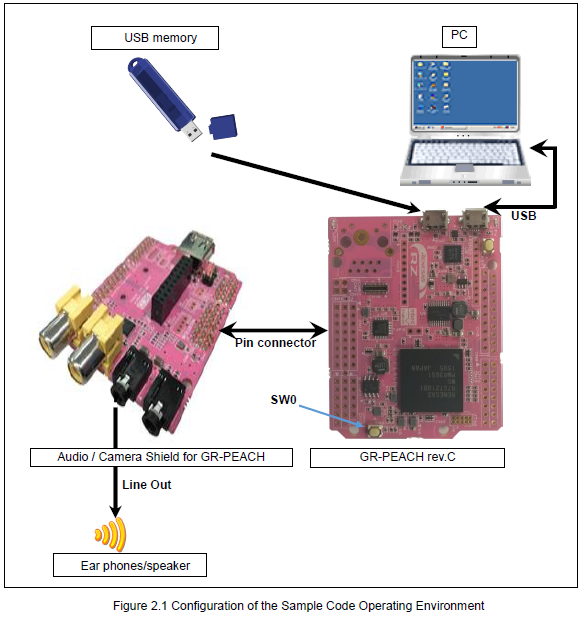
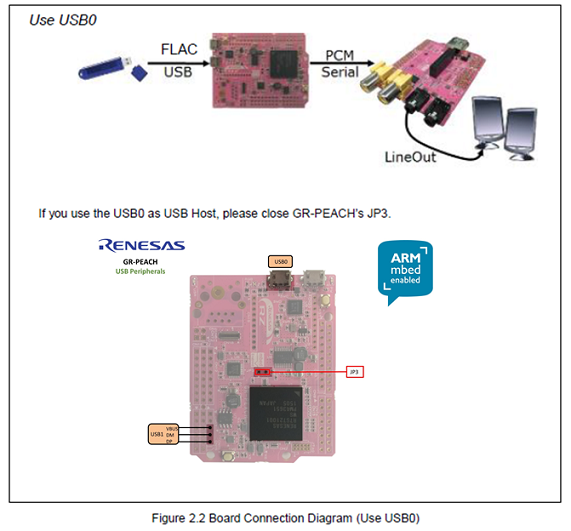
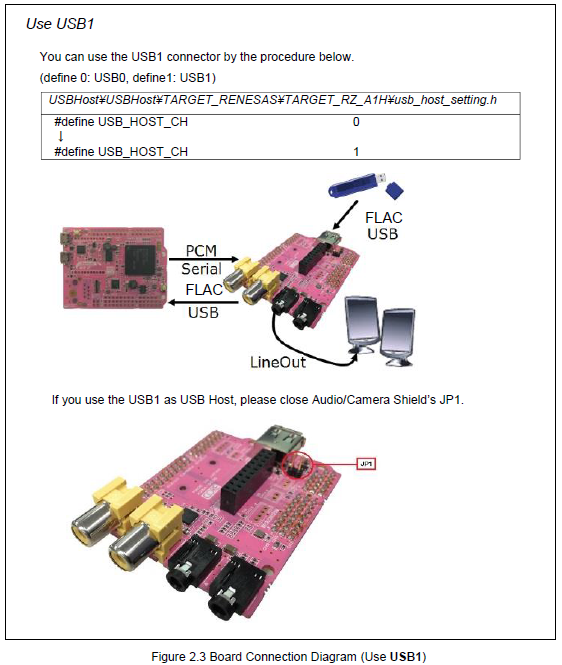
2.2 List of User Operations
A list of user operations on the command line, TFT touch keys, and switch key that the user can perform for this sample code is shown in. Table 2.1.

3. Function Outline
The functions of this sample code are summarized in Table 3.1 to Table 3.3.
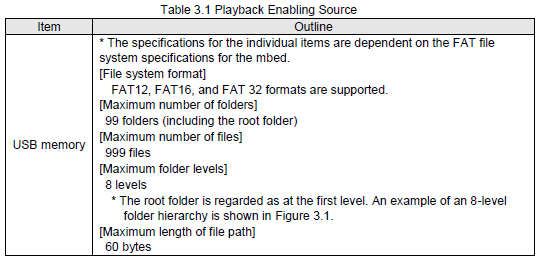
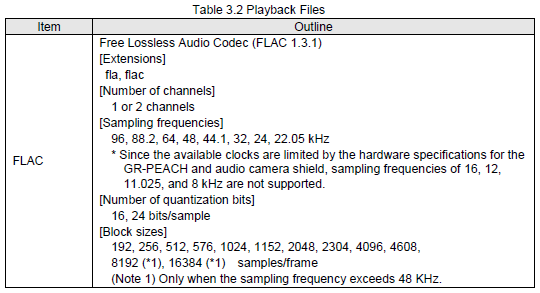
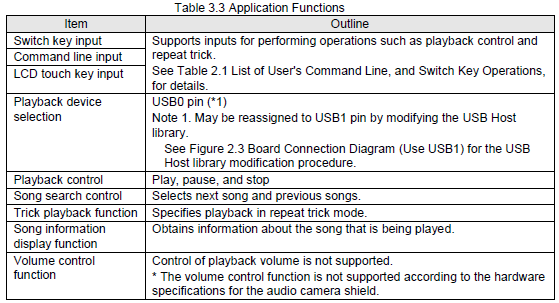
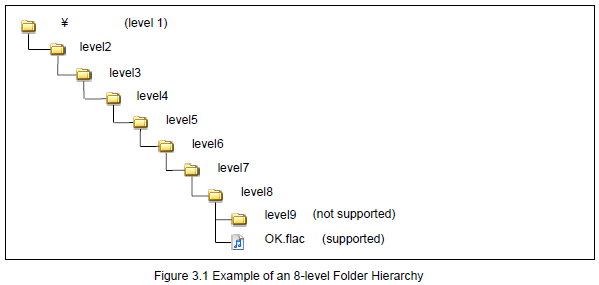
3.1 Playback Control
The playback control that the sample code supports include play, pause, stop, skip to next, and skip to previous.
3.2 Trick Play Control
Manipulating "Repeat" alternates between "Repeat mode On" and "Repeat mode Off". The default mode is "Repeat mode On". When the repeat mode is on, the playback of the first song starts after the playback of the last song is finished. When the repeat mode is off, the sample code enters the stopped state after the playback of the last song is finished.
3.3 Acquisition of the Song Information
The information of the song being played is obtained by operating the "Play info" during the playback of the song. Table 3.4 lists the items of information that can be obtained by the "Play info" operation.

3.4 How the Folder Structure is Analyzed
The sample coded analyzes the folder structure in the breadth-first search order. The order in which files are numbered is illustrated in Table 3.5. The sample code does not sort the files by file or folder name.
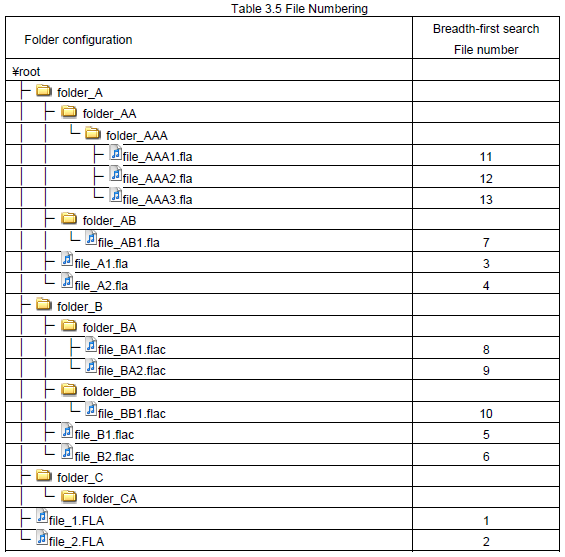
4.Others
The default setting of serial communication (baud rate etc.) in mbed is shown the following link.
Please refer to the link and change the settings of your PC terminal software.
The default value of baud rate in mbed is 9600, and this application uses baud rate 9600.
https://developer.mbed.org/teams/Renesas/wiki/GR-PEACH-Getting-Started#install-the-usb-serial-communication
flac/include/share/compat.h
- Committer:
- 1050186
- Date:
- 2015-12-07
- Revision:
- 3:44c8558c3a83
- Parent:
- 0:ee40da884cfc
File content as of revision 3:44c8558c3a83:
/* libFLAC - Free Lossless Audio Codec library
* Copyright (C) 2012-2014 Xiph.org Foundation
*
* Redistribution and use in source and binary forms, with or without
* modification, are permitted provided that the following conditions
* are met:
*
* - Redistributions of source code must retain the above copyright
* notice, this list of conditions and the following disclaimer.
*
* - Redistributions in binary form must reproduce the above copyright
* notice, this list of conditions and the following disclaimer in the
* documentation and/or other materials provided with the distribution.
*
* - Neither the name of the Xiph.org Foundation nor the names of its
* contributors may be used to endorse or promote products derived from
* this software without specific prior written permission.
*
* THIS SOFTWARE IS PROVIDED BY THE COPYRIGHT HOLDERS AND CONTRIBUTORS
* ``AS IS'' AND ANY EXPRESS OR IMPLIED WARRANTIES, INCLUDING, BUT NOT
* LIMITED TO, THE IMPLIED WARRANTIES OF MERCHANTABILITY AND FITNESS FOR
* A PARTICULAR PURPOSE ARE DISCLAIMED. IN NO EVENT SHALL THE FOUNDATION OR
* CONTRIBUTORS BE LIABLE FOR ANY DIRECT, INDIRECT, INCIDENTAL, SPECIAL,
* EXEMPLARY, OR CONSEQUENTIAL DAMAGES (INCLUDING, BUT NOT LIMITED TO,
* PROCUREMENT OF SUBSTITUTE GOODS OR SERVICES; LOSS OF USE, DATA, OR
* PROFITS; OR BUSINESS INTERRUPTION) HOWEVER CAUSED AND ON ANY THEORY OF
* LIABILITY, WHETHER IN CONTRACT, STRICT LIABILITY, OR TORT (INCLUDING
* NEGLIGENCE OR OTHERWISE) ARISING IN ANY WAY OUT OF THE USE OF THIS
* SOFTWARE, EVEN IF ADVISED OF THE POSSIBILITY OF SUCH DAMAGE.
*/
/* This is the prefered location of all CPP hackery to make $random_compiler
* work like something approaching a C99 (or maybe more accurately GNU99)
* compiler.
*
* It is assumed that this header will be included after "config.h".
*/
#ifndef FLAC__SHARE__COMPAT_H
#define FLAC__SHARE__COMPAT_H
#if defined _WIN32 && !defined __CYGWIN__
/* where MSVC puts unlink() */
# include <io.h>
#else
#if(1) /* mbed */
#include <stdint.h> /* for SIZE_MAX */
#include <stddef.h> /* for size_t */
#define HAVE_LROUND /* Compiler has lround function */
#else /* not mbed */
# include <unistd.h>
#endif /* end mbed */
#endif
#if defined _MSC_VER || defined __BORLANDC__ || defined __MINGW32__
#include <sys/types.h> /* for off_t */
#define FLAC__off_t __int64 /* use this instead of off_t to fix the 2 GB limit */
#if !defined __MINGW32__
#define fseeko _fseeki64
#define ftello _ftelli64
#else /* MinGW */
#if !defined(HAVE_FSEEKO)
#define fseeko fseeko64
#define ftello ftello64
#endif
#endif
#else
#define FLAC__off_t off_t
#endif
#if HAVE_INTTYPES_H
#define __STDC_FORMAT_MACROS
#include <inttypes.h>
#endif
#if defined(_MSC_VER)
#define strtoll _strtoi64
#define strtoull _strtoui64
#endif
#if defined(_MSC_VER)
#define inline __inline
#endif
#if defined __INTEL_COMPILER || (defined _MSC_VER && defined _WIN64)
/* MSVS generates VERY slow 32-bit code with __restrict */
#define flac_restrict __restrict
#elif defined __GNUC__
#define flac_restrict __restrict__
#else
#define flac_restrict
#endif
#define FLAC__U64L(x) x##ULL
#if defined _MSC_VER || defined __BORLANDC__ || defined __MINGW32__
#define FLAC__STRCASECMP stricmp
#define FLAC__STRNCASECMP strnicmp
#else
#define FLAC__STRCASECMP strcasecmp
#define FLAC__STRNCASECMP strncasecmp
#endif
#if defined _MSC_VER || defined __MINGW32__ || defined __CYGWIN__ || defined __EMX__
#include <io.h> /* for _setmode(), chmod() */
#include <fcntl.h> /* for _O_BINARY */
#else
#if(1) /* mbed */
#else /* not mbed */
#include <unistd.h> /* for chown(), unlink() */
#endif /* end mbed */
#endif
#if defined _MSC_VER || defined __BORLANDC__ || defined __MINGW32__
#if defined __BORLANDC__
#include <utime.h> /* for utime() */
#else
#include <sys/utime.h> /* for utime() */
#endif
#else
#if(1) /* mbed */
#else /* not mbed */
#include <sys/types.h> /* some flavors of BSD (like OS X) require this to get time_t */
#include <utime.h> /* for utime() */
#endif /* end mbed */
#endif
#if defined _MSC_VER
# if _MSC_VER >= 1600
/* Visual Studio 2010 has decent C99 support */
# include <stdint.h>
# define PRIu64 "llu"
# define PRId64 "lld"
# define PRIx64 "llx"
# else
# include <limits.h>
# ifndef UINT32_MAX
# define UINT32_MAX _UI32_MAX
# endif
typedef unsigned __int64 uint64_t;
typedef unsigned __int32 uint32_t;
typedef unsigned __int16 uint16_t;
typedef unsigned __int8 uint8_t;
typedef __int64 int64_t;
typedef __int32 int32_t;
typedef __int16 int16_t;
typedef __int8 int8_t;
# define PRIu64 "I64u"
# define PRId64 "I64d"
# define PRIx64 "I64x"
# endif
#endif /* defined _MSC_VER */
#ifdef _WIN32
/* All char* strings are in UTF-8 format. Added to support Unicode files on Windows */
#include "share/win_utf8_io.h"
#define flac_printf printf_utf8
#define flac_fprintf fprintf_utf8
#define flac_vfprintf vfprintf_utf8
#define flac_fopen fopen_utf8
#define flac_chmod chmod_utf8
#define flac_utime utime_utf8
#define flac_unlink unlink_utf8
#define flac_rename rename_utf8
#define flac_stat _stat64_utf8
#else
#define flac_printf printf
#define flac_fprintf fprintf
#define flac_vfprintf vfprintf
#define flac_fopen fopen
#define flac_chmod chmod
#define flac_utime utime
#define flac_unlink unlink
#define flac_rename rename
#define flac_stat stat
#endif
#ifdef _WIN32
#define flac_stat_s __stat64 /* stat struct */
#define flac_fstat _fstat64
#else
#define flac_stat_s stat /* stat struct */
#define flac_fstat fstat
#endif
#ifndef M_LN2
#define M_LN2 0.69314718055994530942
#endif
#ifndef M_PI
#define M_PI 3.14159265358979323846
#endif
/* FLAC needs to compile and work correctly on systems with a normal ISO C99
* snprintf as well as Microsoft Visual Studio which has an non-standards
* conformant snprint_s function.
*
* This function wraps the MS version to behave more like the the ISO version.
*/
#include <stdarg.h>
#ifdef __cplusplus
extern "C" {
#endif
int flac_snprintf(char *str, size_t size, const char *fmt, ...);
int flac_vsnprintf(char *str, size_t size, const char *fmt, va_list va);
#ifdef __cplusplus
};
#endif
#endif /* FLAC__SHARE__COMPAT_H */